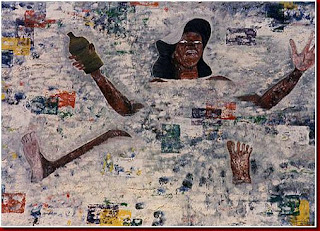Step Four - "Made a searching and fearless moral inventory of ourselves."
"So when A.A. suggests a fearless moral inventory, it must seem to every newcomer that more is being asked of him than he can do. Both his pride and his fear beat him back every time he tries to look within himself. Pride says, "You need not pass this way," and Fear says, "You dare not look!" But the testimony of A.A.'s who have really tried a moral inventory is that pride and fear of this sort turn out to be bogeymen, nothing else. Once we have a complete willingness to take inventory, and exert ourselves to do the job thoroughly, a wonderful light falls upon this foggy scene. As we persist, a brand-new kind of confidence is born, and the sense of relief at finally facing ourselves is indescribable. These are the first fruits of Step Four."
pp. 49-50
"Putting out of our minds the wrongs others had done, we resolutely looked for our own mistakes. Where had we been selfish, dishonest, self-seeking and frightened? Though a situation had not been entirely our fault, we tried to disregard the other person involved entirely. Where were we to blame? The inventory was ours, not the other man's. When we saw our faults we listed them. We placed them before us in black and white. We admitted our wrongs honestly and were willing to set these matters straight."
~Alcoholics Anonymous, 4th Edition, How It Works, pg. 67~
To Aid in taking this moral inventory, consider the following online resources:"The history of this
4th Step Guide is vague but it has been attributed to anonymous members of Alcoholics Anonymous. Various versions could be found on early recovery computer bulletin boards (BBS). One version was dubbed 'The California 4th Step Guide' as it was believed that the originators were located in California.
In any event this guide has well over 300 questions for a person to answer starting with your childhood years, through adolescence, and into your adult life. The guide works for all 12 step programs as the guide is not specific to any particular program. The guide has a very good set of general directions for doing a 4th step."
This is an another
Fourth Step Guide that follows a question and answer format, whose author, Jason Wittman, describes it as follows:
"This is about as complete a guide to writing a 4th Step inventory as you will ever see. I have never found a guide that was both a step by step guide to writing a complete inventory and had complete directions on how to do it. Although it is always suggested that one has a Sponsor who will guide one through this process, many people do not have a Sponsor. I have written the instructions assuming that the reader knows nothing about the process."
This site contains links to printer friendly unpublished
NA Fourth Step guides described as follows:
"These guides come from early drafts of the "Basic Text" and "It Works." Because much of the material in these drafts did not make the final cut, these are not NA conference-approved Fourth Step guides. However, these NA Fourth Step guides are valuable because of their remarkable similarity to the Fourth Step process described in the AA Big Book."
This site provides several different
step work and relapse prevention guides and assistance to 12-Step work and preventing relapse to alcohol and drug addiction.
On its pages "you will find work sheets ready to print and use to guide you through the Twelve Steps. Although our focus is upon the Alcoholics Anonymous approach, these guides can be used for working an NA, CA, CMA, or any other program of recovery. This service is designed to assist with step work, with quotes and pages from the Big Book, with forms ready to copy and utilize. There is a section devoted to relapse prevention as well."
This is a PDF file with charts and lists of defects that are helpful prompts. The site states:
"Everything contained in
these sheets is directly from the Big Book 'Alcoholics Anonymous', there is no opinion, just fact."
This is another set of
4th step worksheets in PDF format with extensive lists of prompts that uses the wording from Alcoholics Anonymous (the Big Book) pages 63-71. A version in rtf (rich text format) is
available hereThis site sets forth a general set of practical directions stating:
"Buy paper and pen and start writing. The AA Big Book says on eight different occasions that we write out this step. It's the writing it down that helps trigger the release."
Another site with
4th Step Work sheets explains that:
"Step Four is a fact-finding and fact-facing process. We are searching for "causes and conditions." We want to uncover the truth about ourselves. We want to discover the attitudes, thoughts, beliefs, fears, actions, behaviors, and the behavior patterns - that have been blocking us, causing us problems and causing our failure.
We want to learn the exact nature our "character defects" and what causes us to do the unacceptable things we do - so that once they are removed - we can acquire and live with new attitudes, thoughts, beliefs, actions and behaviors for our highest good, and for the highest good of those with whom we come in contact.
This prepares us to live a life of purpose - where we can be in maximum fit condition to be of service to others. And, by taking inventory and learning the exact nature of our wrongs - we will be able to recognize when we might be slipping into our old way of life - and headed for new problems, and possibly relapse.
Another approach and guide may be found at this
nalouisville site.
[2nd link updated May 31, 2007]
 Wait, and expect good things - for yourself and your loved ones.
Wait, and expect good things - for yourself and your loved ones.































